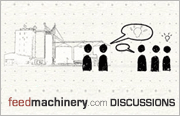
The European Union could lift a ban on the use of animal protein in pig and poultry feed -- imposed in 2001 as part of efforts to fight mad cow disease -- under plans published by the bloc's executive on Friday.
The idea is one of several moves to relax EU measures against bovine spongiform encephalopathy (BSE) and other transmissible forms of the brain-wasting disease.
"The European Union has made great progress in its battle against BSE and we are finally on the brink of eradicating the disease within the Union," EU Health and Consumer Affairs Commissioner John Dalli said in a statement.
Under the European Commission's plans, pig meal could in future be fed to chickens and vice versa, but a ban on "intra species recycling" -- such as feeding pig meal to pigs -- would remain.
A ban on the use of animal protein in feed for cattle and other ruminants such as sheep and goats would also stay.
Other changes mooted in the plan include gradually raising the age limit for testing healthy slaughtered cows for BSE -- currently 48 months for 17 of the EU's 27 member states.
European farmers' lobby Copa-Cogeca welcomed the suggestion, saying it could save farmers millions of euros a year.
"EU figures show that since the testing age has been increased to 48 months since 2009, costs have already dropped from 14.15 million euros ($18.4 million) in 2008 to 9.91 million euros in 2009," Copa-Cogeca Secretary-General Pekka Pesonen said.
BSE was first diagnosed in Britain in 1986, and a total 3.7 million cattle were destroyed there in the 1980s and 1990s as part of efforts to combat the disease.
The Commission's strategy paper will be discussed by EU governments and lawmakears before any legislative proposals are drawn up.
Any proposed changes to the bloc's rules will first have to be scientifically assessed by the European Food Safety Authority, the Commission said.






